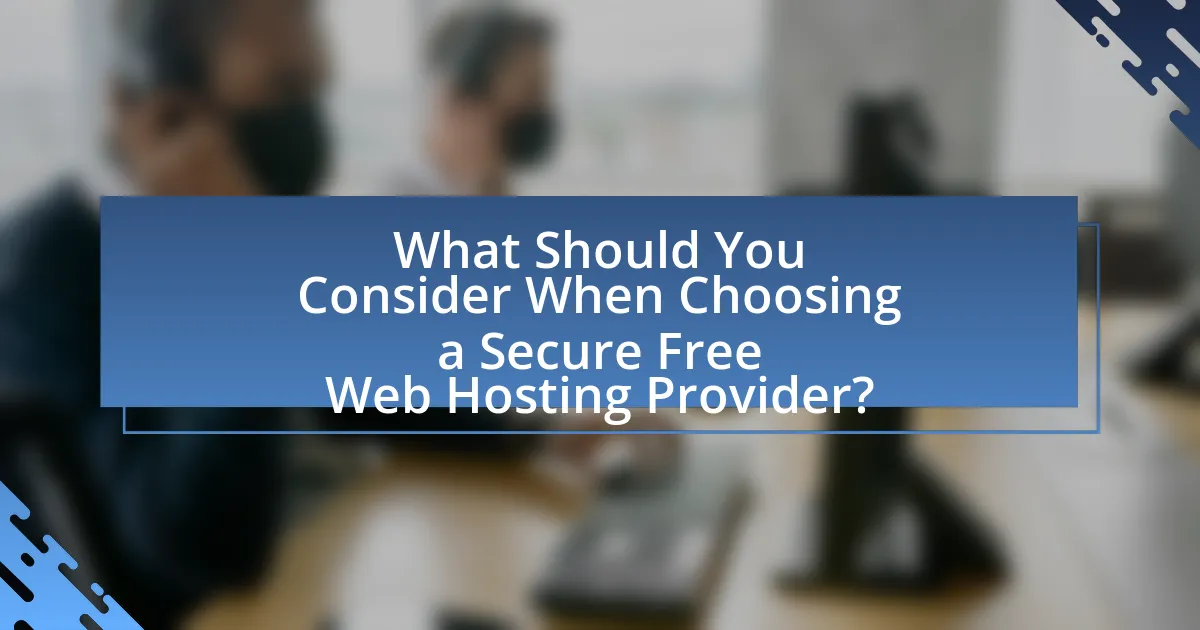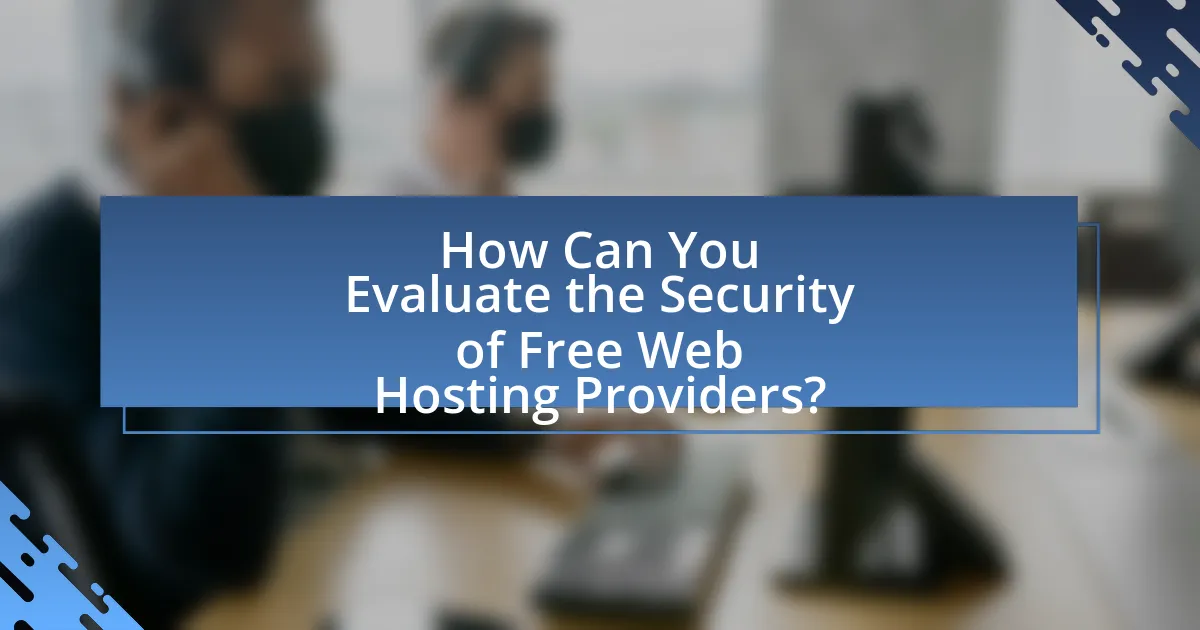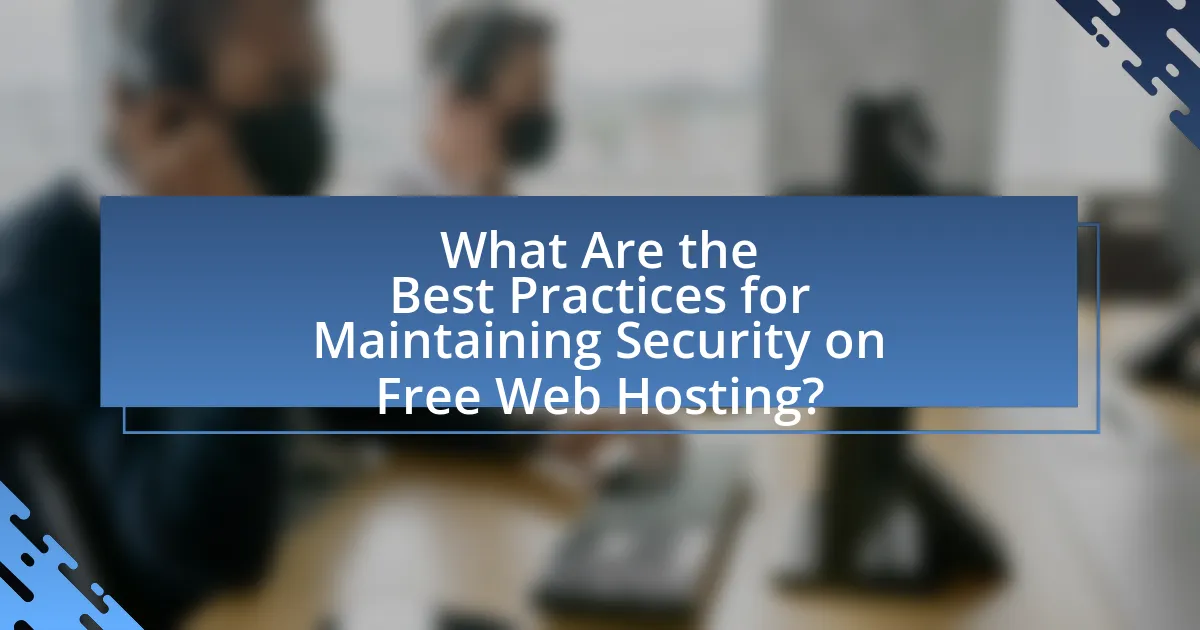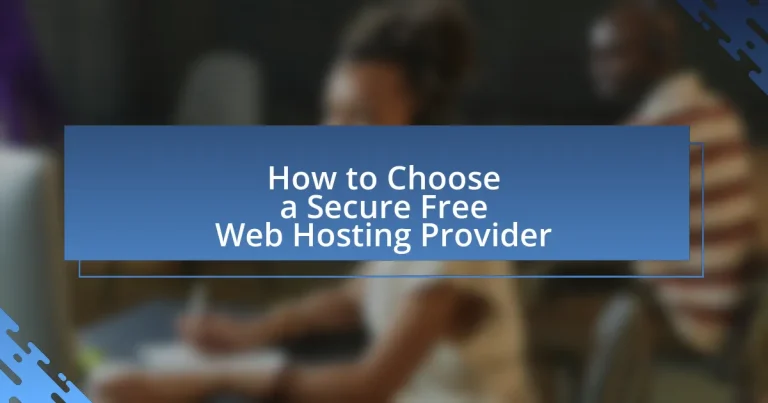Choosing a secure free web hosting provider is crucial for protecting your website from cyber threats and ensuring data integrity. Key considerations include evaluating security features such as SSL certificates, firewalls, and regular backups, as well as the provider’s reputation and user reviews. The article outlines the importance of security in free web hosting, common risks associated with these services, and essential features to look for, such as uptime guarantees and customer support. Additionally, it discusses best practices for maintaining security and practical tips for selecting a reliable provider, emphasizing the need for robust security measures to safeguard sensitive information.

What Should You Consider When Choosing a Secure Free Web Hosting Provider?
When choosing a secure free web hosting provider, prioritize the provider’s security features, such as SSL certificates, firewalls, and regular backups. These features are essential for protecting your website from cyber threats and ensuring data integrity. For instance, a study by Cybersecurity Ventures predicts that cybercrime will cost the world $10.5 trillion annually by 2025, highlighting the importance of robust security measures. Additionally, consider the provider’s reputation and user reviews, as these can indicate the reliability and effectiveness of their security protocols.
How important is security in free web hosting?
Security in free web hosting is critically important due to the inherent vulnerabilities associated with free services. Free web hosting often lacks robust security measures, making websites more susceptible to hacking, data breaches, and malware attacks. According to a 2021 report by the Cybersecurity & Infrastructure Security Agency, 60% of small businesses that experience a cyber attack go out of business within six months, highlighting the severe consequences of inadequate security. Therefore, prioritizing security when selecting a free web hosting provider is essential to protect sensitive data and maintain website integrity.
What are the common security risks associated with free web hosting?
Common security risks associated with free web hosting include limited security features, lack of customer support, and potential exposure to malware. Free web hosting services often do not provide robust security measures such as SSL certificates, firewalls, or regular backups, making websites vulnerable to attacks. Additionally, the absence of dedicated customer support can hinder timely responses to security breaches. Research indicates that free hosting platforms are frequently targeted by cybercriminals due to their lower security standards, increasing the likelihood of malware infections and data breaches.
How can security features vary among free web hosting providers?
Security features can vary significantly among free web hosting providers, impacting the level of protection offered to users. Some providers may offer basic security measures such as SSL certificates and firewalls, while others might lack these essential features entirely. For instance, a study by HostingAdvice in 2021 indicated that only 30% of free hosting services included SSL encryption, which is crucial for data protection. Additionally, the presence of regular security updates and malware scanning can differ; some providers may implement automated scans and updates, while others may not prioritize these practices, leaving users vulnerable to attacks. Therefore, when selecting a free web hosting provider, it is essential to evaluate the specific security features offered to ensure adequate protection for your website.
What are the key features to look for in a secure free web hosting provider?
Key features to look for in a secure free web hosting provider include SSL certification, regular backups, strong uptime guarantees, and robust security measures such as firewalls and malware scanning. SSL certification ensures that data transmitted between the user and the website is encrypted, protecting sensitive information. Regular backups are crucial for data recovery in case of loss or corruption, while strong uptime guarantees (ideally 99.9% or higher) ensure that the website remains accessible. Additionally, robust security measures, including firewalls and malware scanning, help protect against cyber threats, making the hosting environment safer for users.
What types of security protocols should be implemented?
To ensure a secure free web hosting environment, implementing HTTPS, SSL/TLS, and secure FTP protocols is essential. HTTPS encrypts data transmitted between the user and the server, protecting sensitive information from interception. SSL/TLS protocols provide a secure channel over the internet, ensuring data integrity and confidentiality during transmission. Secure FTP (SFTP) enhances file transfer security by encrypting data during transfer, preventing unauthorized access. These protocols collectively safeguard user data and enhance overall security in web hosting.
How does customer support impact security in free web hosting?
Customer support significantly impacts security in free web hosting by providing timely assistance and guidance on security issues. Effective customer support can help users quickly resolve vulnerabilities, implement security measures, and respond to incidents, thereby reducing the risk of data breaches. For instance, a study by the Ponemon Institute found that organizations with strong customer support frameworks experienced 30% fewer security incidents compared to those with inadequate support. This highlights the importance of responsive and knowledgeable customer support in maintaining a secure hosting environment.
Why is user feedback essential in selecting a secure free web hosting provider?
User feedback is essential in selecting a secure free web hosting provider because it offers real-world insights into the provider’s reliability and security measures. Users often share their experiences regarding uptime, customer support, and security incidents, which can highlight potential vulnerabilities or strengths of the hosting service. For instance, a survey by HostingAdvice found that 70% of users consider reviews and feedback critical when choosing a hosting provider, indicating that firsthand accounts can reveal issues not disclosed in marketing materials. This collective knowledge helps prospective users make informed decisions, ensuring they select a provider that prioritizes security and user satisfaction.
How can reviews help identify potential security issues?
Reviews can help identify potential security issues by providing insights into user experiences and reported vulnerabilities. Users often share their encounters with security breaches, data loss, or inadequate protection measures in reviews, which can highlight specific weaknesses in a web hosting provider’s security protocols. For instance, a study by the Ponemon Institute found that 60% of consumers reported security concerns after reading negative reviews about a company’s data protection practices. This feedback can guide prospective users in assessing the reliability and security of a hosting provider before making a decision.
What platforms are best for finding reliable user feedback?
The best platforms for finding reliable user feedback include Trustpilot, G2, and Reddit. Trustpilot aggregates customer reviews and ratings, providing insights into user experiences with various services, including web hosting providers. G2 offers user-generated reviews specifically for software and services, allowing potential customers to evaluate the performance and reliability of web hosting options. Reddit features numerous discussion threads where users share their personal experiences and recommendations regarding web hosting, making it a valuable resource for authentic feedback. These platforms collectively offer a comprehensive view of user opinions, helping individuals make informed decisions when selecting a secure free web hosting provider.

How Can You Evaluate the Security of Free Web Hosting Providers?
To evaluate the security of free web hosting providers, assess their security features, data protection policies, and user reviews. Security features to consider include SSL certificates, firewalls, and DDoS protection, which are essential for safeguarding data. Data protection policies should outline how user information is stored and managed, ensuring compliance with regulations like GDPR. User reviews can provide insights into the reliability and security experiences of current and past users, highlighting any security breaches or vulnerabilities. Additionally, check if the provider offers regular backups and updates, as these are critical for maintaining security over time.
What tools can help assess the security of a web hosting provider?
Tools that can help assess the security of a web hosting provider include security scanners, vulnerability assessment tools, and penetration testing software. Security scanners like Qualys and Nessus can identify vulnerabilities in the hosting environment by scanning for outdated software and misconfigurations. Vulnerability assessment tools such as OpenVAS provide detailed reports on potential security risks, allowing users to prioritize remediation efforts. Additionally, penetration testing software like Metasploit enables users to simulate attacks on the hosting provider’s infrastructure, revealing weaknesses that could be exploited by malicious actors. These tools collectively provide a comprehensive evaluation of a web hosting provider’s security posture.
How do vulnerability scanners work in evaluating web hosting security?
Vulnerability scanners evaluate web hosting security by systematically identifying and assessing potential security weaknesses in web applications and hosting environments. These tools perform automated scans that detect vulnerabilities such as outdated software, misconfigurations, and known security flaws by comparing the target system against a database of vulnerabilities. For instance, according to the Open Web Application Security Project (OWASP), vulnerability scanners can identify issues like SQL injection and cross-site scripting, which are critical for maintaining secure web hosting. By providing detailed reports on identified vulnerabilities, these scanners enable web hosting providers to address security gaps, thereby enhancing overall security posture.
What role do SSL certificates play in web hosting security assessment?
SSL certificates play a crucial role in web hosting security assessment by encrypting data transmitted between a user’s browser and the web server, ensuring confidentiality and integrity. This encryption protects sensitive information, such as login credentials and payment details, from interception by malicious actors. Furthermore, SSL certificates enhance trustworthiness, as browsers display visual indicators, like a padlock icon, signaling to users that the website is secure. According to a study by GlobalSign, 84% of consumers abandon a purchase if they perceive a lack of trust in a website, highlighting the importance of SSL certificates in fostering user confidence.
What questions should you ask potential free web hosting providers?
When evaluating potential free web hosting providers, ask about their uptime guarantees, data security measures, bandwidth limits, storage capacity, customer support availability, and any hidden fees. Uptime guarantees are crucial as they indicate the reliability of the service; for instance, a provider should ideally offer at least 99.9% uptime. Data security measures, such as SSL certificates and regular backups, are essential to protect your website from breaches. Understanding bandwidth limits and storage capacity helps ensure that the hosting service can accommodate your website’s needs without throttling performance. Customer support availability is important for resolving issues quickly, and inquiring about hidden fees can prevent unexpected costs.
How can you verify the security measures they claim to have?
To verify the security measures claimed by a web hosting provider, you should request documentation of their security protocols, such as SSL certificates, data encryption methods, and compliance with standards like GDPR or PCI DSS. Additionally, you can look for third-party security audits or certifications that validate their claims, such as ISO 27001. Checking user reviews and independent assessments can also provide insights into the effectiveness of their security measures.
What should you know about their data backup and recovery processes?
Data backup and recovery processes are critical for ensuring the integrity and availability of hosted data. A secure free web hosting provider should implement regular automated backups, typically on a daily or weekly basis, to safeguard against data loss. Additionally, they should offer multiple recovery options, such as point-in-time recovery, which allows users to restore data from specific timestamps.
For instance, a reputable provider may utilize cloud storage solutions for backups, ensuring redundancy and accessibility. According to a 2021 survey by the Cloud Industry Forum, 70% of businesses reported that having a robust backup strategy significantly reduced downtime during data recovery incidents. This highlights the importance of verifying that the hosting provider has a clear and effective data backup and recovery plan in place.

What Are the Best Practices for Maintaining Security on Free Web Hosting?
To maintain security on free web hosting, users should implement strong password policies, regularly update software, and utilize SSL certificates. Strong passwords reduce the risk of unauthorized access, while software updates patch vulnerabilities that could be exploited by attackers. SSL certificates encrypt data transmitted between the user and the server, enhancing data security. According to a study by the Ponemon Institute, 60% of small businesses experience a cyber attack, highlighting the importance of these practices in safeguarding sensitive information.
How can you enhance security after choosing a free web hosting provider?
To enhance security after choosing a free web hosting provider, implement strong password policies and enable two-factor authentication. Strong passwords reduce the risk of unauthorized access, while two-factor authentication adds an additional layer of security by requiring a second form of verification. According to a study by Google, two-factor authentication can block 100% of automated bots and 96% of phishing attacks, significantly improving account security. Additionally, regularly updating software and plugins can prevent vulnerabilities, as outdated systems are often targeted by cybercriminals.
What steps should you take to secure your website content?
To secure your website content, implement HTTPS encryption, utilize strong passwords, and regularly update software. HTTPS encryption protects data in transit, making it difficult for attackers to intercept sensitive information. Strong passwords prevent unauthorized access; using a combination of letters, numbers, and symbols enhances security. Regularly updating software, including plugins and themes, mitigates vulnerabilities that could be exploited by cybercriminals. According to a 2021 report by Cybersecurity Ventures, 60% of small businesses that experience a cyber attack go out of business within six months, highlighting the importance of these security measures.
How can regular updates and maintenance improve security?
Regular updates and maintenance significantly improve security by addressing vulnerabilities and ensuring that software is equipped with the latest security patches. When web hosting providers implement regular updates, they reduce the risk of exploitation by cybercriminals who often target outdated systems. For instance, according to a report by the Cybersecurity and Infrastructure Security Agency, 85% of successful cyberattacks exploit known vulnerabilities that could have been mitigated through timely updates. Additionally, maintenance practices such as monitoring system performance and conducting security audits further enhance the overall security posture, making it more difficult for unauthorized access or breaches to occur.
What common mistakes should you avoid when using free web hosting?
When using free web hosting, you should avoid common mistakes such as neglecting to read the terms of service, which often include limitations on bandwidth and storage. Many users overlook these details, leading to unexpected downtime or service interruptions. Additionally, failing to implement proper security measures, such as not using HTTPS or neglecting regular backups, can expose your site to vulnerabilities. Research indicates that over 70% of free hosting users experience security breaches due to inadequate protection. Lastly, not considering the potential for ads or branding imposed by the hosting provider can detract from your site’s professionalism, as many free hosts display their own advertisements on user sites.
How can oversharing personal information compromise security?
Oversharing personal information can compromise security by making individuals vulnerable to identity theft, phishing attacks, and social engineering. When users disclose excessive personal details, such as their full name, address, phone number, or even birthdate, malicious actors can exploit this information to impersonate them or gain unauthorized access to accounts. For instance, according to the Identity Theft Resource Center, over 1.4 million identity theft cases were reported in 2020, highlighting the risks associated with sharing personal data. Additionally, social media platforms often serve as a goldmine for attackers, as they can gather information to craft convincing phishing schemes. Thus, limiting the amount of personal information shared online is crucial for maintaining security.
What are the risks of using outdated software on your hosted site?
Using outdated software on your hosted site significantly increases the risk of security vulnerabilities, making it easier for cyber attackers to exploit weaknesses. Outdated software often lacks the latest security patches, which are essential for protecting against known threats. For instance, a report by the Cybersecurity and Infrastructure Security Agency (CISA) highlighted that 60% of breaches involved unpatched vulnerabilities. Additionally, outdated software can lead to compatibility issues, resulting in decreased performance and functionality of the site. This can ultimately harm user experience and damage the site’s reputation. Therefore, maintaining updated software is crucial for ensuring security and optimal performance on hosted sites.
What practical tips can help you choose a secure free web hosting provider?
To choose a secure free web hosting provider, prioritize those that offer SSL certificates, which encrypt data between the user and the server, enhancing security. Additionally, evaluate the provider’s uptime guarantees, as consistent availability indicates reliable service. Look for features like regular backups and malware scanning, which protect your site from data loss and security threats. Research user reviews and expert ratings to assess the provider’s reputation for security. Finally, ensure the provider has a clear privacy policy and terms of service that outline data protection measures, as transparency is crucial for trustworthiness.


